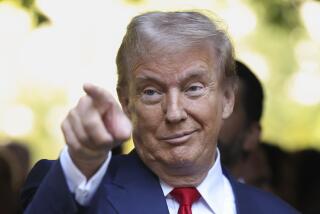The fiscal cliff ... of ’32
Close your eyes in Washington these days and you can almost hear the echoes of 1932. Eighty years ago, just like today, a fiscal crisis almost totally dominated the nation’s capital.
Then, as now, fiscal conservatives demanded immediate action to fix a federal budget awash in red ink. And then, as now, average Americans wondered why all the fuss about deficits. The Depression was in its third year, and millions had no jobs. Why were politicians haggling about balancing the budget?
Is history simply repeating? If so, bring that repeat on, with the same final result. That 1932 fiscal crisis produced an unexpected, and stunning, watershed in U.S. history, the moment when America’s rich and powerful began to lose their lock-grip on the nation’s political pulse.
Elected leaders had until that moment essentially accepted the plutocratic perspective. The Depression, the financially favored insisted, amounted to a natural disaster. Nature had to be allowed to run its course.
The policy prescriptions that elected officials advanced in this political climate boiled down to appeals that the wealthy do the right thing. The wrong thing, President Hoover and congressional leaders of both parties agreed, would be any step that jeopardized “business confidence” in the nation.
Veteran progressives, meanwhile, seethed. Congress was legislating “on fundamentals laid down in the age of the stagecoach,” declared Rep. Fiorello LaGuardia (R-N.Y.). That lawmaking had concentrated “great wealth under the control of a few families” and left “large masses of workers entirely at their mercy.”
That legislating had also left a hole in the federal budget. In the 1920s Congress had slashed the top income tax rate by two-thirds, down to 25%. By late 1931, the federal government, all agreed, desperately needed to collect more revenue to function.
But this new revenue, top Democrats and Republicans also agreed, must not come from the rich. Serious people understood, as Democratic Party Senate leader Joseph Robinson of Arkansas argued, that the government could only tax the rich so much “without discouraging investment and production.” House Speaker John Nance Garner (D-Texas) stressed the same theme. He delivered what a Los Angeles Times dispatch would dub a “mild spanking” to his Democratic colleagues who had dared suggest boosting tax rates on high incomes.
The nation could never meet its fiscal emergency by “soaking the rich,” another Democrat, Charles Crisp of Georgia, added. Average Americans would have to “gird” themselves for “tremendous sacrifices” — a national sales tax or some other tax that demanded “backbone” from all Americans, he said.
The White House agreed, in part. Hoover’s Treasury Department asked Congress to enact new or higher federal excise taxes on many everyday purchases and services. But Hoover, who was running for reelection, would not go along with a national sales tax. He asked Congress instead to raise the nation’s top income tax rate from 25% to 40%.
That infuriated William Randolph Hearst, the powerful media magnate and the most fervent advocate of the national sales tax proposal. Hearst and his fellow rich had no particular fondness for taxing sales. They simply wanted Congress to put in place an alternative to taxing income — their income.
The House Ways and Means Committee obliged and repudiated Hoover, passing instead a 2.25% manufacturer’s levy on everything but food.
What happened next stunned Washington. Average Americans pushed back, bombarding Congress with angry complaints about the pending stab at a national sales tax. Rank-and-file Democrats in Congress quickly responded. They joined with progressive Republicans and killed the conservative tax proposal.
Amid House floor shouts of “soak the rich!” the rebellious lawmakers then raised the top income tax rate from 25% to 63%.
House Majority Leader Henry Rainey (D-Ill.) sought to contain the damage. He went live on national radio and tried to convince Americans that the rich had sacrificed enough. Lawmakers, Rainey pronounced, had raised income taxes on the wealthy “to the very breaking point.” They had “soaked the rich.”
In fact, the soaking was more a quick rinse. The revenue legislation Congress passed still depended heavily on excise taxes, many on everyday items. Even so, the 1932 tax fight marked a turning point. The rich reached for the brass ring, a national sales tax, and the people slapped them down.
In New York, an ambitious governor took notice. Just two weeks after the tax battle, Franklin D. Roosevelt, a candidate for the 1932 Democratic presidential nomination, would begin a series of addresses that aligned his candidacy with the grass-roots push against plutocracy.
“Do what we may have to do to inject life into our ailing economic order,” FDR would explain, “we cannot make it endure for long unless we can bring about a wiser, more equitable distribution of the national income.”
The New Deal had begun.
What will we begin?
Sam Pizzigati edits Too Much, the Institute for Policy Studies’ weekly on excess and inequality. This piece is adapted from his new book, “The Rich Don’t Always Win: The Forgotten Triumph over Plutocracy that Created the American Middle Class, 1900-1970.”
More to Read
A cure for the common opinion
Get thought-provoking perspectives with our weekly newsletter.
You may occasionally receive promotional content from the Los Angeles Times.










